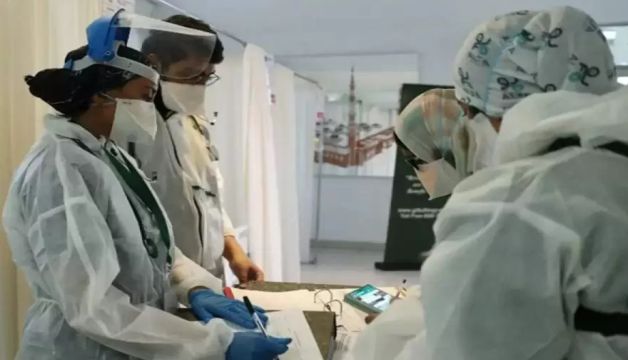South Africa Lifts Curfew As The Omicron Wave Subsides
South Africa, where the Omicron variant was discovered last month, says the latest wave of coronavirus has peaked with no increase in deaths or hospital admissions, allowing the country to lift a night curfew for the first time in 21 months.
The Omicron variant became the dominant variant of the pandemic in November and led to new cases worldwide at an all-time high.
“According to experts, Omicron has risen to the top … with clinical demonstrations that did not raise the alarm in the hospital situation,” said Mondli Gungubele, cabinet minister to President Cyril Ramaphosa on Friday.
“According to experts, the conditions allow the curfew to be lifted,” he said at a press conference, giving concrete form to a decision announced by the presidency the previous evening.
Demands from the hotel industry to lift the curfew from midnight to 4 a.m. They escalated before the New Years’ celebrations, and restaurant and bar owners started an online petition to put pressure on Ramaphosa.
Many countries outside of Africa are tightening restrictions to combat rising infections.
The minister warned that “we will be monitoring the situation hour by hour” and will restore it if necessary, adding: “I hope he never returns.”
Gungubele said the government of Africa’s most advanced but hardest hit economy has taken steps to try to “reconcile livelihoods and save lives”.
“Businesses are suffering,” he said.
Omicron Wait
The highly contagious variant of Omicron, which contains a number of mutations, fueled the resurgence of a global pandemic late in the year.
But mounting evidence in South Africa and elsewhere has fueled hope that while Omicron is more contagious than other strains, it could also be less severe.
Infections in South Africa fell nearly 30% last week from the seven days before, according to the president’s office, and while hospital admissions also fell in eight of the nine provinces.
Nevertheless, the risk of increased infections is “still high,” warned the presidency in its statement on Thursday evening.
Wearing a mask is still mandatory in public spaces and public gatherings are limited to 1,000 people indoors and 2,000 people outdoors.
The government continued to insist on the need for precautions and vaccinations.
Vaccination rates have also improved: more than 15.6 million people in South Africa have been fully vaccinated, out of a population of 59 million.
Few Dead On The Rise
The December outbreak saw only a marginal increase in deaths from Covid-19, while hospitalization rates were lower than in previous waves, the president said.
“That means the country has spare capacity to host patients, even for routine health services.”
Omicron was first identified in South Africa and Botswana in late November.
It quickly became the dominant tribe in South Africa, causing an explosion in infections, peaking at around 26,000 daily cases, recorded in mid-December, as per the official statistics.
As per the World Health Organization (WHO), the variant is currently present in more than 100 countries.
Vaccinated people and people who have been infected with the coronavirus in the past can also be infected with it, although these people also have a significantly lower risk of becoming seriously ill.
Also Read: Omicron Tends To Go Unnoticed In Rapid Antigen Test Kits
South Africa is hardest hit by the coronavirus with more than 3.4 million cases and 91,000 deaths on the continent. However, fewer than 13,000 infections have been recorded in the past 24 hours.
“The speed at which the Omicron-powered fourth wave climbed, peaked, and then fell again was astounding. A high in four weeks and a steep decline in two more,” Fareed Abdullah of the South African Medical Research Council wrote on Twitter.
With many countries affected by Omicron re-introducing countermeasures against the virus, South Africa has announced that it will reverse the trend just before the New Year celebrations and one day before the weekend’s funeral. The revered anti-apartheid icon Desmond Tutu.
Also Read: COVID-19: Recent Global Developments

